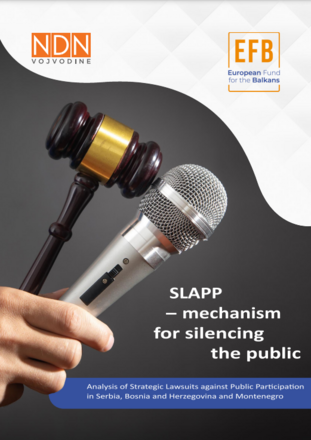
Strategic Lawsuits Against Public Participation (SLAPPs) are legal actions initiated by people in a power position - both in economic and political terms - whose scope is to put pressure on media outlets, journalists, and civil activists to hamper their reporting activities and prevent them from critical participation. SLAPPs often rely on the deterrent effect of legal costs, which are often unbearable for the defendants, especially when lawsuits accumulate.
This analysis was realized as part of the project “Raising Public Awareness about SLAPP Lawsuits Serbia, Montenegro and Bosnia and Herzegovina”carried out by the Independent Journalists’ Association of Vojvodina (IJAV) along with the Helsinki Citizens’ Assembly Banja Luka (hCa) and the Montenegro Media Institute (MMI).
The analysis provides a significant insight into the SLAPP phenomenon in Serbia, Bosnia and Herzegovina, and Montenegro by combining data on the number and targets of SLAPPs and interviews with some defendants currently exposed to vexatious lawsuits in the three countries.
It shows that SLAPPs are a worrying threat to democracy in all three countries and that - despite the specific features that this phenomenon can take - their chilling effect significantly impacts the activities of journalists and activists across the region, often leading to (self) censorship.
Serbia. The report shows that for journalists who are targeted by a SLAPP, solidarity from the journalistic community is important to deal with the effects of such intimidation. For NGO activists, bringing their struggles with SLAPPs to public attention is an additional weapon against threats from people in power. Some cases also highlight the bias in the legal system, especially when processes are instigated by powerful actors, thus demonstrating a great mismatch between plaintiffs and defendants before the law.
Bosnia and Herzegovina. The main targets are journalists and activists concerned about environmental issues, criminal activities, and corruption within the political sphere. The reintroduction of defamation into the Criminal Code in Republika Srpska further deteriorated the situation. The country also lacks lawyers specialized in dealing with SLAPPs, as many of them are already under the radar of the local government. Hence, the “BH novinari” association is advocating for the establishment of a fund for the defense of journalists, as well as for the introduction of anti-SLAPP provisions into the Bosnian legal framework. The presence of a captured judicial system however hampers such requests.
Montenegro. Defamation and insult have been decriminalized since 2011, following recommendations of the European Commission. Yet, some political parties are advocating for reintroducing the defamation offense into the Criminal Code, thus blowing up all the efforts made by Montenegro to improve its legal framework. According to the Trade Union of Media of Montenegro, 210 lawsuits for the infringement of honor and reputation were issued against journalists and media outlets between 2011 and 2020. Interestingly enough, the vast majority of plaintiffs were citizens and media outlets that sued their competitors.
The authors conclude by mentioning solidarity within the journalistic communities and awareness raising on the censorious outcomes of vexatious lawsuits as important tools in the fight against SLAPPs.
Tags: SLAPP Western Balkans Media freedomThe content of this article can be used according to the terms of Creative Commons: Attribution-NonCommercial 4.0 International (CC BY-NC 4.0) . To do so use the the wording "this article was originally published on the Resource Centre on Media Freedom in Europe" including a direct active link to the original article page.

